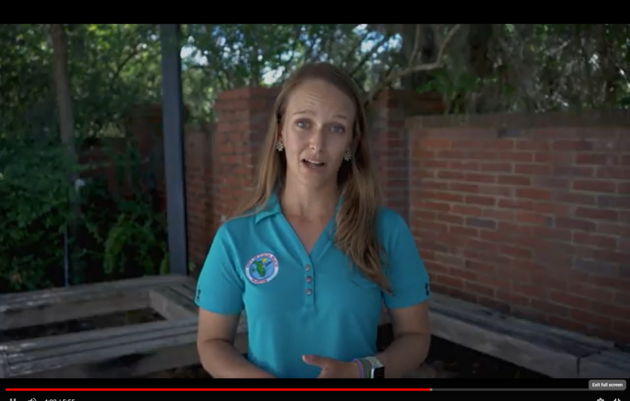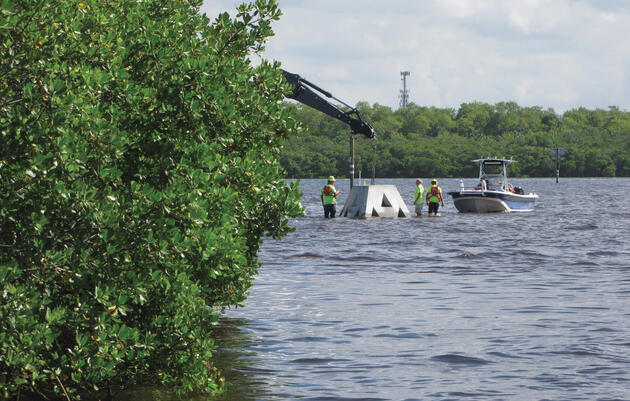The Tampa Bay Regional Resilience Cohort, established in January by Audubon Florida in partnership with ICLEI-Local Governments for Sustainability, Pinellas County UF/IFAS Extension, and the University of South Florida, paired students with ten visionary cities and two counties in the Tampa Bay region. This innovative partnership developed baselines for greenhouse gas emissions in municipal operations. Four months later, the cohort members have finished their reports and the program concluded its weekly training, but the real work still lies ahead.
“Florida’s local governments are seeing the impacts of our changing climate firsthand and are leading the way with this commitment to accountability and innovation,” said Julie Wraithmell, Executive Director of Audubon Florida. “We are thrilled to once again partner on this work, accelerating sustainability, saving taxpayer dollars, and making Tampa Bay communities more resilient... all while providing on-the-job training for the next generation of leaders in this field.”
Changing climate is a challenge that threatens communities, plants, and animals, especially birds. Reducing greenhouse gas emissions is one solution to create safer, healthier communities, save taxpayer dollars, and protect our natural resources.
Local governments use greenhouse gas inventories to assess the emissions produced by operations in their municipality’s buildings, fleets, waste services, and more. By understanding their municipal operations, local governments create a critical framework for local resiliency decisions to reduce emissions and maximize efficiency while providing transparent accountability to their taxpayers. In addition, student fellows earn valuable experience in project management, resilience planning, and municipal operations while gaining class credit toward their graduation requirement.
Ramona Madhosingh-Hector, a regional Specialized Agent in the Southwest District with UF/IFAS who focuses on urban sustainability, served as liaison among the participating local governments.
“This is an important step forward in understanding how municipal activities at local and regional levels impact climate emissions, and inform policy tools and strategies to mitigate those impacts,” said Madhosingh-Hector. “And, thanks to the partnership with Audubon and ICLEI, participating cities were able to leverage student interns and technical support to achieve the project’s goals,” she concluded.
"This program offered USF Environmental Science and Policy student fellows a unique opportunity to prepare for future careers in the field of climate resiliency," said Dr. Connie Mizak, Professor of Instruction at USF's School of Geosciences. "By working closely with local governments and Audubon Florida team members, my students developed important career readiness skills in the areas of communication and collaboration, critical thinking, and professionalism that has helped prepare them for success in the workplace," she said, adding that she was pleased to have partnered with Audubon Florida on this important project and grateful for the opportunity it afforded her students.
“I learned a really important skill through this process, and that is to properly convey my ideas,” said Alyssa Anderson, a USF student majoring in Environmental Science and Policy. “Communicating complex information with others was difficult, but I eventually became more comfortable,” she added.
Jackson Roberts, a USF Environmental Science and Policy student, said he gained great experience gathering and analyzing data.
"From my experience, I learned how to estimate/extrapolate data to best represent GHG emissions. I plan on using this skill and many others I picked up throughout the cohort as I analyze future data sets," said Roberts.
Even some of the municipality representatives learned more than they expected.
“I learned a lot about how complicated this data can be – getting the information from so many different departments was a challenge, but we learned so much,” said Allan Biddlecomb, Public Infrastructure Program Administrator with Pasco County.
"The City of Largo is committed to being a leader in Resilience in Tampa Bay and this cohort was a wonderful way to accelerate our efforts to reduce our greenhouse gas emissions, said Laura Thomas, Sustainability Program Administrator for the City of Largo. "It allowed cities to collaborate with each other, industry experts, and students to achieve a shared mission. Thanks to the cohort’s unified process, the City can now use this data to help build an energy program and greenhouse gas emissions goals in the future."
Audubon Florida funded and co-facilitated the greenhouse gas inventories with the Cohort and ICLEI as part of their commitment to strengthening climate resilience through science, innovation, and entrepreneurship for the benefit of Florida’s communities, ecosystems, and birds.
In 2021, Audubon Florida launched its first greenhouse gas cohort with partners in the East Central Florida Regional Resilience Collaborative. Audubon plans to continue to expand this effort to new regions throughout Florida.
About the Partners:
- ICLEI – Local Governments for Sustainability is a global network of more than 1,750 local and regional governments committed to sustainable urban development. Active in 100+ countries, ICLEI influences sustainability policy and drives local action for low emission, nature-based, equitable, resilient, and circular development. icleiusa.org
- Audubon Florida has worked to protect birds and the places they need in Florida for 120 years, advancing common-sense solutions grounded in strong science.
Academic Institutions:
- University of South Florida – St. Pete Campus
- University of South Florida – Tampa Campus
Counties
- Pasco
- Sarasota
Cities/Towns
- Largo
- Belleair
- Sarasota
- Treasure Island
- Safety Harbor
- St. Pete Beach
- Clearwater
- Dunedin
- Tarpon Springs
- Oldsmar






